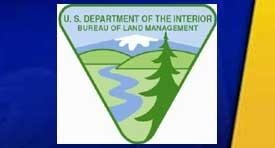BLM begins to restore access to some developed areas in Oregon

PORTLAND, Ore. (KTVZ) -- Following guidance from the White House, Centers for Disease Control and Prevention and state and local public health authorities, the Bureau of Land Management said Monday it is increasing recreational access in Oregon.
The BLM is working with federal, state, and local public health authorities to closely monitor the COVID-19 pandemic and using a phased approach to increase access on a case-by-case basis.
Visitors should expect differing levels of services and available facilities across Oregon. Updates on affected Oregon BLM facilities can be found online at https://www.blm.gov/oregon-washington/covid-access-restrictions or by calling your local BLM office:
- Burns District: 541-573-4400, BLM_OR_BU_Mail@blm.gov
- Coos Bay District: 541-756-0100, BLM_OR_CB_Mail@blm.gov
- Lakeview District: 541-947-2177, BLM_OR_LV_Mailbox@blm.gov
- Medford District: 541-618-2200, BLM_OR_MD_Mail@blm.gov
- Northwest Oregon District: 503-375-5646, BLM_OR_NO_Mail@blm.gov
- Prineville District: 541-416-6700, BLM_OR_PR_Mail@blm.gov
- Roseburg District: 541-440-4930, BLM_OR_RB_Mail@blm.gov
- Vale District: 541-473-3144, BLM_OR_VL_Mail@blm.gov
The health and safety of our visitors, employees, volunteers, and partners continues to be paramount. Across the state, our operational approach will be to examine each facility, function, and service provided to ensure those operations comply with current public health guidance. We continue to work closely with the Department of the Interior and are following CDC guidance to ensure public and employee spaces are safe and clean for visitors, employees, partners, and volunteers.
The restoration of access to BLM recreation sites will be gradual and in coordination with the state of Oregon and our local partners.
“We’re all in this together. BLM districts are ensuring that we’re taking the appropriate steps to protect the health and safety of our visitors and our recreation workforce,” said Jose Linares, Acting State Director for BLM Oregon/Washington. “Although we look forward to welcoming visitors back to our developed recreation facilities, we are asking for the public’s patience during this time of transition. We can’t stress enough that everyone should continue to follow guidance from the CDC and local officials when visiting their public lands.”
The CDC has offered guidance to help people recreating on public lands prevent the spread of infectious diseases. We will continue to monitor all functions to ensure that visitors adhere to CDC guidance for mitigating risks associated with the transmission of COVID-19 and take any additional steps necessary to protect public health. The BLM encourages all visitors to incorporate the following outdoor recreation practices for safety and to avoid placing unnecessary strain on local communities and America’s public lands:
- If you are sick, stay home.
- Practice physical distancing and good hygiene. Follow CDC guidance on social distancing, maintaining at least six feet between you and those outside your immediate household. Avoid touching high-traffic surfaces.
- Stay close to home. The state is still discouraging non-essential travel; this is not the time to travel long distances to recreate. Be sure to bring enough food, water, sunscreen, etc., for the entire day so you can avoid unnecessary stops.
- Plan ahead to avoid crowds. Consider planning day trips during off-peak visitation times, such as early in the morning or on weekdays. Avoid crowding by not spending extra time in parking lots, at trailheads, or at boat launches. Launch one boat at a time to give others enough space to launch safely. Leave at least one parking space between your vehicle and the vehicle next to you.
- Come prepared. Visitors will likely find reduced or limited access to restrooms as the BLM begins restoring access at individual recreation sites and should bring their own soap/water/hand sanitizer and toilet paper.
- Leave no trace. Many BLM recreation sites are also likely to have reduced or suspended trash collection services at developed recreation sites. All visitors are expected to follow Leave No Trace practices, including packing out all items they packed in, such as toilet paper, disposable gloves and masks, and food refuse.
- Avoid unnecessary risks. Health care workers and first responders are working hard to keep us all safe. Visitors should avoid high-risk activities that could potentially put a strain on local first responders, medical providers, and/or search and rescue teams.
- Prevent wildfires. As the region enters the spring and summer months, the BLM asks visitors to use fire prevention practices and reminds visitors that the use of fireworks, target shooting with exploding targets, and fire tracer or incendiary devices is prohibited on BLM-administered public lands in Oregon.
- Be kind to others. The BLM is proud to play a role in restoring access to some of America’s backyard treasures and provide nearby communities with the opportunity to enjoy their public lands during these stressful times. We are all in this together, so please be considerate of and welcoming to other visitors from appropriate physical distances. Please be particularly kind to park staff during these challenging times and help them do their jobs by doing your part to take care of each other and our beloved outdoors.
Details and updates on operations will continue to be posted on our website, https://www.blm.gov/oregon-washington/covid-access-restrictions and social media channels. Updates about BLM operations will be posted on www.blm.gov.
Current closures are pursuant to the Code of Federal Regulations (CFR): 43 CFR § 8364.1, 43 CFR § 9268.3(d)(1), and 43 CFR § 8365.1-4.
The BLM manages more than 245 million acres of public land located primarily in 12 Western states, including Alaska. The BLM also administers 700 million acres of sub-surface mineral estate throughout the nation. In fiscal year 2018, the diverse activities authorized on BLM-managed lands generated $105 billion in economic output across the country. This economic activity supported 471,000 jobs and contributed substantial revenue to the U.S. Treasury and state governments, mostly through royalties on minerals.